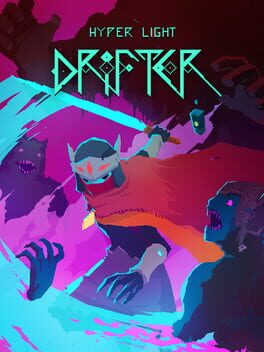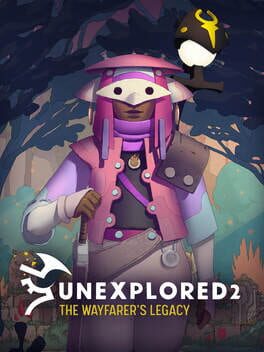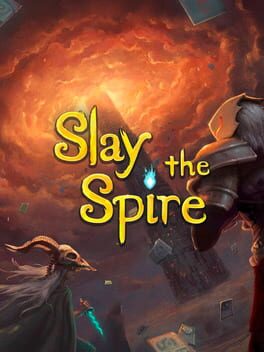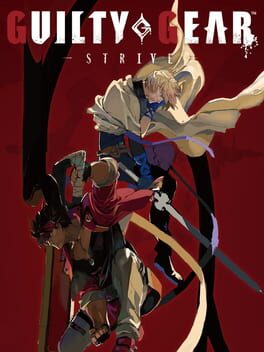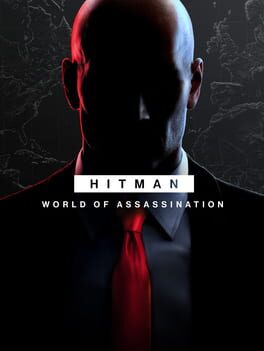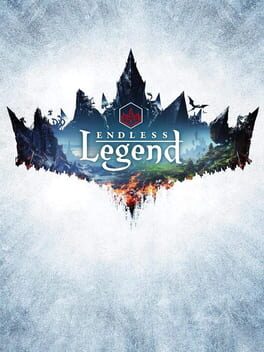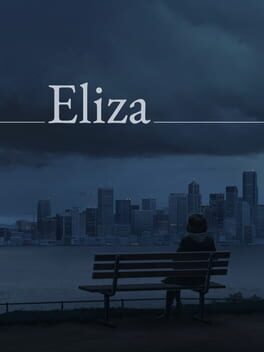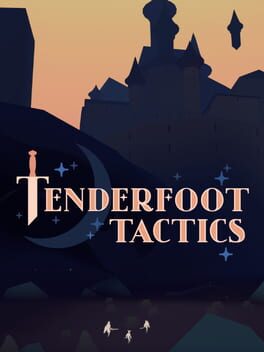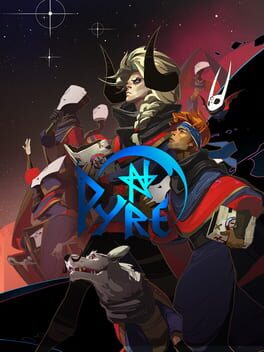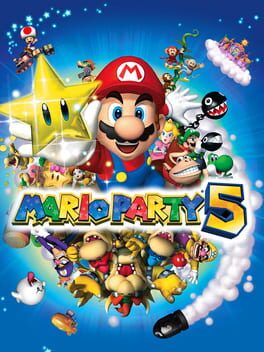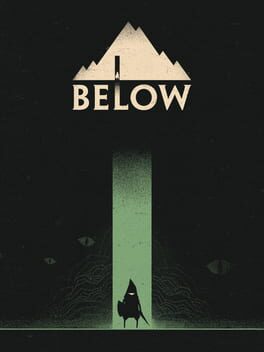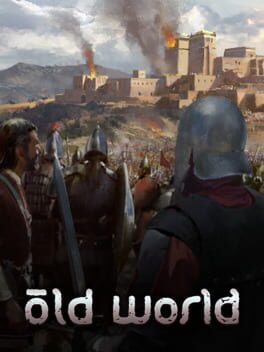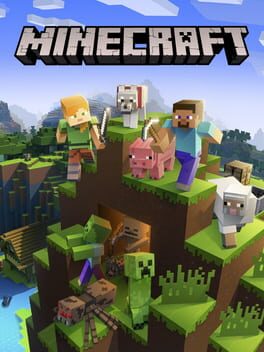Glorgu's Gallery of Great Games
I have a hard time really determining favorites for games, but there are games that stick with me. They stay on my mind, they influence how I think about other games.
I may return to them consistently, or I may let my solitary experience with them linger in my head. I may not have enjoyed them as much at the time I was playing as I do on reflection afterwards, but that reflection is just as valid a part of my experience with the work.
Many of them are more recent. I understand it may be weird to see a favorite game list and see so many games not even five years old at the time of this writing (2022). It may be they're fresher on my mind. It may be the sheer volume of games being created now means more resonate with the specific things I love in games. It may just be that games are more meaningful to me right now than they were decades ago. It's also an admittedly pretentious effort on my part to avoid this list looking like a nostalgic tour of games past (with one very clear exception). All these things are factors.
I don't love any of these games without understanding of their issues; they are all flawed, and my recommendations usually come with some caveat. Still, I cherish all of these games for one reason or another, and I think you should at least consider playing them!
Anyways, here's a collection of games I consider among favorites.
I may return to them consistently, or I may let my solitary experience with them linger in my head. I may not have enjoyed them as much at the time I was playing as I do on reflection afterwards, but that reflection is just as valid a part of my experience with the work.
Many of them are more recent. I understand it may be weird to see a favorite game list and see so many games not even five years old at the time of this writing (2022). It may be they're fresher on my mind. It may be the sheer volume of games being created now means more resonate with the specific things I love in games. It may just be that games are more meaningful to me right now than they were decades ago. It's also an admittedly pretentious effort on my part to avoid this list looking like a nostalgic tour of games past (with one very clear exception). All these things are factors.
I don't love any of these games without understanding of their issues; they are all flawed, and my recommendations usually come with some caveat. Still, I cherish all of these games for one reason or another, and I think you should at least consider playing them!
Anyways, here's a collection of games I consider among favorites.
14 Games
An aesthetically brilliant game, that happens to be mechanically brilliant as well.
It pulls at me to return to some day, and analyze every detail. Every frame feels deliberate. The way environment and palette and music evolves through each stage carefully crafted. I want to know why. But I also really don't. The game likes being unknowable, I'd hate to shatter that feeling in pursuit of an academic understanding of why that is the case.
This is all before speaking to the game mechanically. The dash feels really dang good. Possibly the best dash in a game. And chaining said dashes together has such a pleasant rhythmic quality to it. That's more than enough honestly, but to have such pleasant feel to its combat and encounter design beyond that makes for so much more.
Yeah, I'll be returning to this, maybe to learn, or maybe just to vibe. Probably just to vibe.
Upadte: I did return to this just to vibe. It was excellent. Then I started to work and try and get every achievement. In doing so, this game revealed a deeper mechanical layer that proved to be the all-time best action I've played.
It pulls at me to return to some day, and analyze every detail. Every frame feels deliberate. The way environment and palette and music evolves through each stage carefully crafted. I want to know why. But I also really don't. The game likes being unknowable, I'd hate to shatter that feeling in pursuit of an academic understanding of why that is the case.
This is all before speaking to the game mechanically. The dash feels really dang good. Possibly the best dash in a game. And chaining said dashes together has such a pleasant rhythmic quality to it. That's more than enough honestly, but to have such pleasant feel to its combat and encounter design beyond that makes for so much more.
Yeah, I'll be returning to this, maybe to learn, or maybe just to vibe. Probably just to vibe.
Upadte: I did return to this just to vibe. It was excellent. Then I started to work and try and get every achievement. In doing so, this game revealed a deeper mechanical layer that proved to be the all-time best action I've played.
Rain World is unwilling to indulge my power fantasies, but not because of some idea that satisfaction is best derived from overcoming hardships. That is a factor for sure, but more than anything, it understands my role in it's ecosystem. I am the Slugcat. I know what a Slugcat knows, I am capable of what a Slugcat is capable of; no more, no less. In strictly defining and insisting on my role, it makes for a special experience.
The game feels alive.
My presence isn't needed for the game to thrive, but it responds to my presence and actions nonetheless. With observation and intuition, I can learn how this ecosystem works, and through that I can find some inner-purpose for being here. And that's beautiful.
I do think this game could afford to explain the mechanical aspects of being a Slugcat more directly. It provides some detail, but in trying to be quiet about it, it makes some vital concepts easy to miss. Nonetheless, it is a rare experience I really do love.
The game feels alive.
My presence isn't needed for the game to thrive, but it responds to my presence and actions nonetheless. With observation and intuition, I can learn how this ecosystem works, and through that I can find some inner-purpose for being here. And that's beautiful.
I do think this game could afford to explain the mechanical aspects of being a Slugcat more directly. It provides some detail, but in trying to be quiet about it, it makes some vital concepts easy to miss. Nonetheless, it is a rare experience I really do love.
Imagine you're playing a table-top RPG with a GM who has a tome on world building and overall campaign structure, but is making up the moment-to-moment on the fly. That may sound like a bad thing, but I promise you it's a fucking treat.
I wouldn't say the generation process for the game's world and the spaces within is earth-shattering, but it is expressive in a way I haven't seen before. At times it feels like the game is being hastily tuned by a GM. It taunts me just as much as it rewards my observation. Sometimes it seems to understand I've been having a rough go of it and lets me off easy, though just as many times it will provide a good "fuck you".
And I know my imagination is filling in a lot here, but that's good on this game — like the clever GM it is — to understand sometimes the best thing to do is give me just enough material to let my mind wander. And what a lovely journey I'm having.
I wouldn't say the generation process for the game's world and the spaces within is earth-shattering, but it is expressive in a way I haven't seen before. At times it feels like the game is being hastily tuned by a GM. It taunts me just as much as it rewards my observation. Sometimes it seems to understand I've been having a rough go of it and lets me off easy, though just as many times it will provide a good "fuck you".
And I know my imagination is filling in a lot here, but that's good on this game — like the clever GM it is — to understand sometimes the best thing to do is give me just enough material to let my mind wander. And what a lovely journey I'm having.
I don't have anything insightful to say on this game. It's such a tight mechanical experience. Every single decision you make is about your deck. Either in the choices your deck provides you on any given turn, or in the structuring of your deck. It makes for such a satisfying challenge in the fundamental values of a card game. Just incredible stuff.
The game that got me understanding fighting games. Compelled by playing it on stream against friends and losing terribly, I sunk hundreds of hours into learning fighting games and now find them to be a really fun competitive outlet. Don't know if this will ultimately remain my favorite fighting game, but as of now it represents the on-ramp into a genre of games I have found immensely satisfying to learn and play.
I am one of four children who lived in a house where we usually only had one PC or console that could reliably play games. I ended up watching lots of games for this reason. We would all help each other, talk through ideas, cheer each other on, give each other shit for mistakes we also would have absolutely made were we handed the controller. It was largely good times.
With that in mind, I really value these Hitman games for being just as much fun to watch as they are to play. I had many evenings, hanging out on a voice call with friends (or sometimes in real life), where we'd watch each other attempt the same level through different requirements generated by a script I wrote. It was a blast. These games are so effortlessly funny and emergent. And playing them through a brain trust of all your friends — who have no better idea of how to get out of this situation you just put yourself in, let's be real — is a delight I highly recommend.
They are also exceptional solo experiences. I found myself spending hours just breathing in each map, poking around for some more story in hopes to figure out a whole new avenue for how to play through this level. Stories would get weird and often all too relevant. As I watch capitalism and hate destroy my actual world: at the very least, in this carefully crafted sandbox, I could punish that exploitation and hate. That's honestly, really worth something.
With that in mind, I really value these Hitman games for being just as much fun to watch as they are to play. I had many evenings, hanging out on a voice call with friends (or sometimes in real life), where we'd watch each other attempt the same level through different requirements generated by a script I wrote. It was a blast. These games are so effortlessly funny and emergent. And playing them through a brain trust of all your friends — who have no better idea of how to get out of this situation you just put yourself in, let's be real — is a delight I highly recommend.
They are also exceptional solo experiences. I found myself spending hours just breathing in each map, poking around for some more story in hopes to figure out a whole new avenue for how to play through this level. Stories would get weird and often all too relevant. As I watch capitalism and hate destroy my actual world: at the very least, in this carefully crafted sandbox, I could punish that exploitation and hate. That's honestly, really worth something.
It would be dishonest of me to pretend that 4X games have not had a foundational influence on my interest in games — as compromised as I find the very premise of the genre to be. Endless Legend happens to be my favorite of them.
As one-of-those, it is mechanically engaging, and does a good job in providing reason for the player to give a shit about its world. Primarily through aesthetics, and a consistent, if occasionally fraught story. It creates interest and provides reward in ways many Grand Strategy games don't.
But one vital aspect of it for me is as a reminder that I should play games I enjoy.
It is not difficult for a game to compel me play it for a long time. The science behind what mechanics, systems, and structures keep a player playing a game are understood and constantly evolving. Additionally, there is a general floor of engagement and quality most games have now where they're just usually pretty good.
It can make it easy to get absorbed by games and experiences where I look back with perspective, and feel some regret. Anybody looking at my top played games on Steam will see these regrets, proudly at the top. Many of the top games on there are not the ones you'll see on this list.
Some of those games I have fond memories of playing with with people I care about, but many are the result of me following the skinner-box they place in front of me. Whether because I'm playing with friends, or because real life proved to be too fucking tough, and an escape into something effortlessly playable is what I felt I needed at the time.
4X design is by it's nature is exploitative in this manner. As trite as the "one more turn" idea is, that's exactly what drives these games. The feedback loop remains engaging far beyond the actual quality of experience I am having.
But Endless Legend is a bit different. It's the game I return to when another 4X or Grand Strategy game is leading me down that rabbit hole. I often will start other games of this type to just have the lingering thought of "okay, but Endless Legend just does all this better." And more often than not, I'll return to Endless Legend, play a game or two, and find myself much happier.
It's just as exploitative a design in many ways, but the bits of reward and satisfaction it provides beyond it's feedback loop are genuinely valuable to me. Sure, the story and the world Amplitude have created has problems, and the game is starting to show some age technically and in its design. Nonetheless, it remains a delightful game to poke at, to interface with, to ponder on turns as my understanding of it continues to evolve.
So at least for 4X and Grand Strategy as a whole, I'm glad I have Endless Legend to remind me I can — and should — expect more.
As one-of-those, it is mechanically engaging, and does a good job in providing reason for the player to give a shit about its world. Primarily through aesthetics, and a consistent, if occasionally fraught story. It creates interest and provides reward in ways many Grand Strategy games don't.
But one vital aspect of it for me is as a reminder that I should play games I enjoy.
It is not difficult for a game to compel me play it for a long time. The science behind what mechanics, systems, and structures keep a player playing a game are understood and constantly evolving. Additionally, there is a general floor of engagement and quality most games have now where they're just usually pretty good.
It can make it easy to get absorbed by games and experiences where I look back with perspective, and feel some regret. Anybody looking at my top played games on Steam will see these regrets, proudly at the top. Many of the top games on there are not the ones you'll see on this list.
Some of those games I have fond memories of playing with with people I care about, but many are the result of me following the skinner-box they place in front of me. Whether because I'm playing with friends, or because real life proved to be too fucking tough, and an escape into something effortlessly playable is what I felt I needed at the time.
4X design is by it's nature is exploitative in this manner. As trite as the "one more turn" idea is, that's exactly what drives these games. The feedback loop remains engaging far beyond the actual quality of experience I am having.
But Endless Legend is a bit different. It's the game I return to when another 4X or Grand Strategy game is leading me down that rabbit hole. I often will start other games of this type to just have the lingering thought of "okay, but Endless Legend just does all this better." And more often than not, I'll return to Endless Legend, play a game or two, and find myself much happier.
It's just as exploitative a design in many ways, but the bits of reward and satisfaction it provides beyond it's feedback loop are genuinely valuable to me. Sure, the story and the world Amplitude have created has problems, and the game is starting to show some age technically and in its design. Nonetheless, it remains a delightful game to poke at, to interface with, to ponder on turns as my understanding of it continues to evolve.
So at least for 4X and Grand Strategy as a whole, I'm glad I have Endless Legend to remind me I can — and should — expect more.
I really enjoy visual novels as a medium. Many narratives would work much better as visual novels than the larger scoped and more mechanically involved games they become.
As it is, by being a visual novel, structure is provided to the narrative of Eliza. The structure shapes the players points of interaction with the narrative to elevate the themes even further. Additional mechanics would dilute the focus and do little to enhance your experience with the narrative. That a renown puzzle game developer made the deliberate decision to forgo any frivolous mechanical depth to ensure the narrative was delivered in a focused, impactful way, hopefully demonstrates the value in visual novels as a narrative medium.
Side note: it's a game pretty much anyone in CS should play.
As it is, by being a visual novel, structure is provided to the narrative of Eliza. The structure shapes the players points of interaction with the narrative to elevate the themes even further. Additional mechanics would dilute the focus and do little to enhance your experience with the narrative. That a renown puzzle game developer made the deliberate decision to forgo any frivolous mechanical depth to ensure the narrative was delivered in a focused, impactful way, hopefully demonstrates the value in visual novels as a narrative medium.
Side note: it's a game pretty much anyone in CS should play.
I love tactics games, but rarely do they provoke something in me beyond joy in mastering their mechanics and systems — or the tension that comes with that process. Tenderfoot Tactics demanded I feel things.
Like any team focused tactics game worth playing, I ended up loving the individuals on the team for the stories that emerged mechanically as I played. It's beyond that though, where this game becomes exceptional.
This game's vague, sometimes abstract aesthetics, in addition to a general lack of clarity, carefully establish tone and provoke emotion in a manner I found unique for a tactics game.
I was enthralled by how the world would appear in front of me as I explored freely, but there was a hint of melancholy to it. Everything was made so ephemeral. Just as I discovered something new, whatever I left behind disappeared into a vagueness. I'd maybe never see it again.
And the battles, dang. I became so startled and tense as battles would start, the world disappeared even further, everything funneled into this X by Y block I was tasked to understanding intimately now. Terrain details suddenly erupted from the ground. The music diminishing to an uneasy beat or unsettling drone — no game makes sub-bass more upsetting.
As tense as the battles were, it was a delight watching this small world they dropped me into transform. The terrain shifted chaotically. Fires blazed, bushes and trees emerged. Managing this world was as much of a challenge as whatever foe I was facing. And that drone or beat that pulled me into this space evolved, channeling that same chaos.
If you like tactics games and have a PC that can run it, treat yourself please!
Like any team focused tactics game worth playing, I ended up loving the individuals on the team for the stories that emerged mechanically as I played. It's beyond that though, where this game becomes exceptional.
This game's vague, sometimes abstract aesthetics, in addition to a general lack of clarity, carefully establish tone and provoke emotion in a manner I found unique for a tactics game.
I was enthralled by how the world would appear in front of me as I explored freely, but there was a hint of melancholy to it. Everything was made so ephemeral. Just as I discovered something new, whatever I left behind disappeared into a vagueness. I'd maybe never see it again.
And the battles, dang. I became so startled and tense as battles would start, the world disappeared even further, everything funneled into this X by Y block I was tasked to understanding intimately now. Terrain details suddenly erupted from the ground. The music diminishing to an uneasy beat or unsettling drone — no game makes sub-bass more upsetting.
As tense as the battles were, it was a delight watching this small world they dropped me into transform. The terrain shifted chaotically. Fires blazed, bushes and trees emerged. Managing this world was as much of a challenge as whatever foe I was facing. And that drone or beat that pulled me into this space evolved, channeling that same chaos.
If you like tactics games and have a PC that can run it, treat yourself please!
I've written the same exact thing about Pyre so many times. Just look everywhere else on my backloggd, it's probably the same quote that I wrote about this game when it came out in 2017. But that's because despite everything, possibly by accident even, this game provides an understanding of professional sport and labor in general I haven't seen in any other game, or really much anywhere.
It's one of the only sports games that understands being a professional athlete isn't fun. It can be, but so often it's not. It's a job, and jobs are bullshit. Even for athletes. I don't even know if that was one of the intentional themes in the game, but it stands out.
The sport in this game, The Rites, is not a fun event. It's a somber ritual that just happens to be gamified. I am having fun playing The Rites, but their results mean much more to the players I control than they do to me, and everyone else in Downside. Each player has stakes in the results. Many may not know it yet, but the Commonwealth above has stakes in this too.
With this understanding looming over, every conversation with one of the Nightwings carries an intensity to it. You can talk to me about my past, or my love interest or whatever, but damn it David, we need to win those fucking Rites.
And that's the thing, the stakes may not feel as high for a professional athlete as they do for my Nightwings, but the system around professional sports is messed up enough that it's unfortunately all too close. For it to take a fantasy visual-novel sports game to capture that notion before any actual sports game is upsetting, but what a game.
It's one of the only sports games that understands being a professional athlete isn't fun. It can be, but so often it's not. It's a job, and jobs are bullshit. Even for athletes. I don't even know if that was one of the intentional themes in the game, but it stands out.
The sport in this game, The Rites, is not a fun event. It's a somber ritual that just happens to be gamified. I am having fun playing The Rites, but their results mean much more to the players I control than they do to me, and everyone else in Downside. Each player has stakes in the results. Many may not know it yet, but the Commonwealth above has stakes in this too.
With this understanding looming over, every conversation with one of the Nightwings carries an intensity to it. You can talk to me about my past, or my love interest or whatever, but damn it David, we need to win those fucking Rites.
And that's the thing, the stakes may not feel as high for a professional athlete as they do for my Nightwings, but the system around professional sports is messed up enough that it's unfortunately all too close. For it to take a fantasy visual-novel sports game to capture that notion before any actual sports game is upsetting, but what a game.
Most games are on here because I think they're good. This game is not. I know at the top I said you should play all the games on this list, you can skip out on this one.
This is here because it provided some very fun, often chaotic memories with family and friends. It certainly sticks out as a game foundational to parts of my life. I'm not going to pretend I'm just out here playing good games all the time (though I'm sure nobody's accusing me of that).
This is here because it provided some very fun, often chaotic memories with family and friends. It certainly sticks out as a game foundational to parts of my life. I'm not going to pretend I'm just out here playing good games all the time (though I'm sure nobody's accusing me of that).
When I said at the top "I may not have enjoyed them as much at the time I was playing as I do on reflection afterwards," this was the game burned into my mind.
Below is a rough experience. Often more frustrating than it ought to be. It will put you into some real bullshit situations. I cannot speak to the exploration mode as I didn't play it, hopefully it mitigates some of the frustration I had to make for a more well rounded experience.
But through this bullshit was the core of what I love about these sorts of games. Come on, you've seen this compendium. You get what's up. I enjoy games heavily focused on systems and mechanics, and reward discovery, careful observation, preparation, and maybe some (or a lot of) practice. Below does that in a beautiful, concise manner. It falls apart a bit with the practice element, I wouldn't say otherwise. But as a game about exploring, learning, and the alluring anticipation built through preparation, it excels.
I play so many other games that try to capture this same thing, but so many just don't get it right. There may be secrets, a made up language, or intentional vagueness around how the games systems work or what you should be doing, but they don't execute on it just right. The confusion I have in play doesn't line up with the satisfaction I'd want when it's made clear. It's unrewarding.
Below doesn't get this right all the time either, as I keep alluding to. But the things it does master have stayed in my mind as I continue to play these sorts of games. Every new area discovered, eureka moment, new tool at my disposal provoked a cosmically unsettling level of joy. I couldn't tell you why, what technical tricks if any provoked that, but nonetheless I would be elated. The biggest mystery in Below is what drove me to keep going. And as such, I may never be over this game.
Sometimes you can get away with a flawed experience as long as the doors are really, really tall.
Below is a rough experience. Often more frustrating than it ought to be. It will put you into some real bullshit situations. I cannot speak to the exploration mode as I didn't play it, hopefully it mitigates some of the frustration I had to make for a more well rounded experience.
But through this bullshit was the core of what I love about these sorts of games. Come on, you've seen this compendium. You get what's up. I enjoy games heavily focused on systems and mechanics, and reward discovery, careful observation, preparation, and maybe some (or a lot of) practice. Below does that in a beautiful, concise manner. It falls apart a bit with the practice element, I wouldn't say otherwise. But as a game about exploring, learning, and the alluring anticipation built through preparation, it excels.
I play so many other games that try to capture this same thing, but so many just don't get it right. There may be secrets, a made up language, or intentional vagueness around how the games systems work or what you should be doing, but they don't execute on it just right. The confusion I have in play doesn't line up with the satisfaction I'd want when it's made clear. It's unrewarding.
Below doesn't get this right all the time either, as I keep alluding to. But the things it does master have stayed in my mind as I continue to play these sorts of games. Every new area discovered, eureka moment, new tool at my disposal provoked a cosmically unsettling level of joy. I couldn't tell you why, what technical tricks if any provoked that, but nonetheless I would be elated. The biggest mystery in Below is what drove me to keep going. And as such, I may never be over this game.
Sometimes you can get away with a flawed experience as long as the doors are really, really tall.
So... I wrote a lot about Endless Legend, and it turns out there may be a new Grand Strategy game taking its spot.
In many ways, Old World is an accumulation of lessons from the genre with some new ideas delivered in a satisfyingly dense game.
How do you keep the player invested through the endgame? How do you keep the map interesting and important for players less focused on militaristic strategies? How do you balance wide and tall strategies? Old World has answers for all of these things and more, to varying degrees of success, but it's looking to fix some of the foundational issues of the genre in a very interesting way.
I'll write more later... I may need some distance before I decide if this will stay here or not, but I do want to recognize there's a contender here.
In many ways, Old World is an accumulation of lessons from the genre with some new ideas delivered in a satisfyingly dense game.
How do you keep the player invested through the endgame? How do you keep the map interesting and important for players less focused on militaristic strategies? How do you balance wide and tall strategies? Old World has answers for all of these things and more, to varying degrees of success, but it's looking to fix some of the foundational issues of the genre in a very interesting way.
I'll write more later... I may need some distance before I decide if this will stay here or not, but I do want to recognize there's a contender here.
Do I love this game? No, it's obviously good, but no. Do I think it was a catalyst for getting my family as close as we are now? Absolutely. For that reason I think it deserves a spot.
